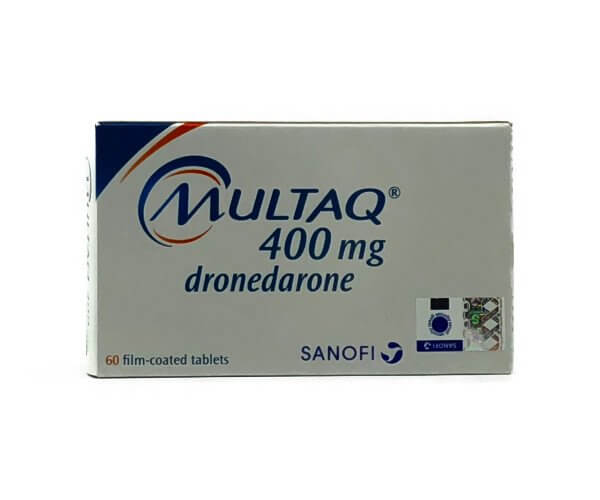Multaq is an oral prescription medication used to manage specific heart rhythm disorders, particularly
atrial fibrillation (AFib) and
atrial flutter (AFl). It contains
dronedarone, an antiarrhythmic agent that works by affecting multiple ion channels in the heart, helping to regulate electrical impulses. This action prevents erratic heart rhythms, thus reducing the risks associated with these conditions, such as stroke and heart failure. Multaq is typically
prescribed for patients who are in sinus rhythm but are at risk of experiencing a recurrence of atrial fibrillation or flutter. It helps maintain a stable heart rhythm, making it a useful long-term solution for managing these conditions. The drug belongs to the Class III group of antiarrhythmics, but its exact mechanism of action involves blocking potassium, sodium, and calcium channels as well as adrenergic receptors.
Patients using Multaq should be aware that it is not suitable for everyone. Doctors usually avoid this medication for patients with severe heart failure or permanent atrial fibrillation due to increased risks of serious cardiovascular events. Multaq’s effectiveness is heightened when combined with lifestyle adjustments to lower risk factors for heart disease, such as managing blood pressure and cholesterol levels.
For a deeper understanding of how Multaq works, it is important to note that
dronedarone has been designed to have fewer toxic effects than other antiarrhythmics, especially concerning the thyroid and lungs. This makes it a preferable option for long-term use in some patients, although it still requires careful monitoring by healthcare professionals, particularly with respect to liver and kidney function.
Multaq has been approved for treating patients who have had their heart rhythm restored to normal, but who remain vulnerable to experiencing another arrhythmic episode. The medication is not recommended for those who have permanent atrial fibrillation because it has been associated with an increased risk of hospitalization in these patients. Multaq is typically used as part of a comprehensive treatment plan that includes other heart medications, regular follow-up visits with a cardiologist, and lifestyle changes.
Dosage
Follow the prescribing doctor’s instructions at all times. If there are any questions, ask the doctor or a pharmacist for help. The typical dosage of
Multaq is one 400 mg tablet taken twice daily with meals. Patients are advised to take the medication at the same time each day, once with breakfast and once with dinner, to maintain consistent levels of the drug in the body throughout the day. Do not crush or chew the tablets.
Storage
Store
Multaq in a cool, dry place away from direct sunlight. Keep the medication in its original packaging and out of reach of children. If there are any questions,
consult our blog on safe medicine management.
Questions people ask about Multaq
What is Multaq used for?
Multaq is primarily used to treat irregular heartbeats, specifically atrial fibrillation and atrial flutter. It helps maintain a normal heart rhythm in patients who have previously had these conditions but are currently in normal sinus rhythm.
How does dronedarone work in the body?
Dronedarone works by affecting the electrical signals in the heart that cause arrhythmias. It blocks multiple ion channels, which helps prevent erratic heartbeats and maintains a stable rhythm.
What is atrial fibrillation?
Atrial fibrillation (AFib) is a condition where the upper chambers of the heart beat irregularly, causing the heart to pump less efficiently. This can increase the risk of blood clots, stroke, and heart failure if left untreated.
Common Side effects include Diarrhea
Nausea
Vomiting
Pain in the stomach area
Indigestion when you begin taking MULTAQ
Additional side effects may include:
Feeling tired and weak
Skin problems such as redness, rash, and itching
MULTAQ is indicated for the maintenance of sinus rhythm after successful cardioversion in adult
clinically stable patients with paroxysmal or persistent atrial fibrillation (AF).
Due to its safety profile (see sections 4.3 and 4.4), Multaq should only be prescribed after alternative
treatment options have been considered.
MULTAQ should not be given to patients with left ventricular systolic dysfunction or to patients with
current or previous episodes of heart failure.













